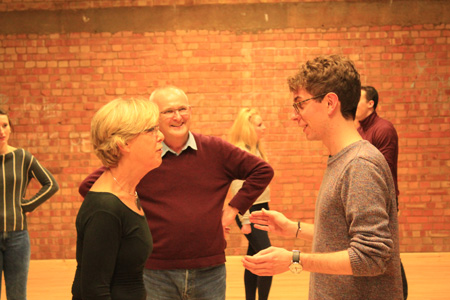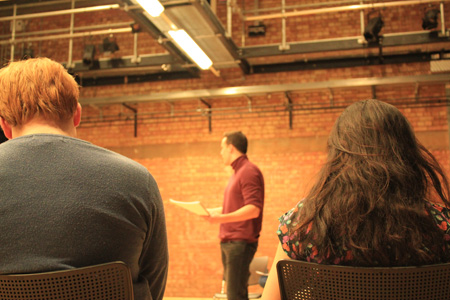This week in Did You Know?: Breaking boundaries
 In a new series of features, each week we’ll be taking a look at a different area of the student experience and finding out more about the work being undertaken to develop that area. This week we look at a model of teaching that breaks the boundaries of lecture-based learning
In a new series of features, each week we’ll be taking a look at a different area of the student experience and finding out more about the work being undertaken to develop that area. This week we look at a model of teaching that breaks the boundaries of lecture-based learning
In response to student feedback informing us that the traditional lecture/seminar format of teaching was antiquated, many departments, with the support of IATL, are exploring new ways of engaging their students to create a better learning experience.
In the warm-up, we try to undo everything the students have learnt since they were three!”
Shakespeare and the Law, convened jointly by the School of Law and the Department of English and Comparative Literary Studies, is a 15 CAT module that takes advantage of one of the many Open-Space Learning Centres across Warwick campus. The course consists of one 3-hour ‘class’ per week in the Humanities Studio, where Law students and English students are taught together and the traditional format of lectures and seminars is put to the side in favour of rehearsal and performance teaching techniques.
It’s great to get out of a lecture theatre. There are no desks which helps you feel like you’re the master of your own experience; rather than being spoon-fed
facts and figures, you’re encouraged to develop your own thinking.’
This module makes full use of Warwick’s excellent Open-Space Learning facilities; each session starts with a warm-up where the teachers join in with the students in a variety of physical activities. Participants then share their own ideas on points of law in the works of Shakespeare under the guidance of Professors Paul Raffield and Carol Rutter. 
When we are encouraged to embody the characters of the texts we are mooting about, I engage much more with the text than I ever could with academic journals or textbook reading.”
It's so rewarding to be part of such a collaborative module where everyone is keen to share their ideas. It's so interesting to work with people on different courses as you get such a range of perspectives.”
Did you also know…?
- As well as the Humanities Studio, used to full-effect by Professors Paul Raffield and Carol Rutter, IATL maintains 4 other bookable spaces
 across the University, for use by both academic staff in the creation of their own modules and students looking for somewhere to rehearse.
across the University, for use by both academic staff in the creation of their own modules and students looking for somewhere to rehearse. - IATL has been instrumental in the development of two specific pedagogies created specifically for use in higher education: Open-space Learning
 , and Student-as-Researcher. IATL’s activities are informed by these pedagogies – and by those of many expert colleagues in the wider University – and they create a solid theoretical and practical base from which to create their own projects, and support those of others.
, and Student-as-Researcher. IATL’s activities are informed by these pedagogies – and by those of many expert colleagues in the wider University – and they create a solid theoretical and practical base from which to create their own projects, and support those of others. - IATL’s Student as Producer Fund
 is available to support innovative teaching and learning projects arising or separate from the curriculum run by students, with the support of an academic mentor.
is available to support innovative teaching and learning projects arising or separate from the curriculum run by students, with the support of an academic mentor. - In November 2011, IATL and the Space Management and Timetabling Team were awarded £1,000,000 from the University’s Capital Investment Fund to refurbish teaching rooms in the Ramphal Building
 . The refurbishment was carried out in January-March 2013 to create a flagship building for teaching spaces at Warwick, containing flexible, comfortable and aesthetic classrooms to empower tutors and learners to create an atmosphere where collaborative, research-oriented and interdisciplinary learning is possible.
. The refurbishment was carried out in January-March 2013 to create a flagship building for teaching spaces at Warwick, containing flexible, comfortable and aesthetic classrooms to empower tutors and learners to create an atmosphere where collaborative, research-oriented and interdisciplinary learning is possible.
Read more in the Did You Know? series with Did You Know?: IATL Interdisciplinary Module
